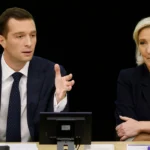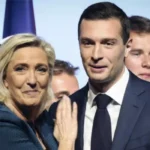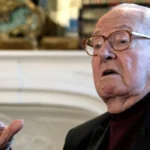European leaders have agreed on the three names that will occupy the key positions of the EU. The machine is in motion for the next five years in the European Union. What is the next step in the procedure?
The European summit was faster than expected. The 27 heads of state and government approved the candidates for the EU’s top positions on Thursday evening. Ursula von der Leyen, Antonio Costa and Kaja Kallas will respectively occupy the presidency of the European Commission, the European Council and European diplomacy.
This approval is the first step in a mechanism that should lead to the more complete composition of the next leadership of the Union.
The election of former Portuguese Prime Minister António Costa is final. He will succeed the current President Charles Michel on 1 December.
However, Ursula von der Leyen and Kaja Kallas still need to obtain the approval of the European Parliament before being officially appointed.
Former Estonian Prime Minister Kaja Kallas will appear before the Parliament’s Foreign Affairs Committee, where she will need to secure the support of a majority of MEPs in a vote scheduled for September that will confirm her as EU High Representative for Foreign Affairs and Security Policy. “My goal now is to reach out to MEPs and get their support,” she said in a message on the social network X after the European Council meeting.
Outgoing European Commission President Ursula von der Leyen will also be put to a vote in Parliament, but she will need an absolute majority in the chamber to validate a second term.
The vote is scheduled for the 16-19 July plenary session in Strasbourg, where she will need to secure 361 votes out of the 720 MEPs who make up the Parliament. The vote will be by secret ballot, making it difficult to gauge the chamber’s support.
However, the leaders of the three largest political groups of the last legislature: the European People’s Party (EPP), the Socialists & Democrats (S&D) and Renew Europe, have already accepted her nomination, which means that most of their representatives will probably vote in favour. To get the necessary votes, Ursula von der Leyen explains that she will approach delegations and MEPs who are not part of the current coalition.
“I will also work intensively with the national delegations, because experience shows that within the groups, voting tendencies are different,” the German official said after the European Council agreement.
The Greens, who have 54 MEPs, could play this role of ally during the vote because they have declared themselves open to negotiations.
“We believe that the only way to create a stable pro-European, pro-democratic and pro-Ukraine majority is to bring together the four parties,” Green co-chair Bas Eickhout explained after the elections earlier this month. According to him, the only way to create a sustainable majority is to include a fourth party in the agreement.
However, the group has set a clear red line before entering into negotiations. There is no question of concluding a political pact with the European Conservatives and Reformists (ECR) of Italian Prime Minister Giorgia Meloni.
The Socialists also refuse to validate a coalition agreement with a far-right group, whether it is ECR or ID (Identity and Democracy). S&D group leader Iratxe García reiterated her position on Wednesday during a meeting with Ursula von der Leyen. The Spanish MEP says she respects the lead candidate process, according to which the party that obtains the best result in the European elections can appoint the leader of the Commission, but she warns that there will be no blank cheque.
Georgia Meloni’s Fratelli d’Italia MEPs could also support Ursula von der Leyen. But this decision remains very uncertain. The fact that the Italian leader abstained from voting at the summit on the nomination of Ursula von der Leyen, while rejecting the nominations of Antonio Costa and Kaja Kallas, suggests that the Prime Minister is leaving the door ajar for discussion.
If Ursula von der Leyen receives the support of the Parliament in July, she will then start working on the composition of her next Commission.
While no names are final yet, some countries have already presented their candidates. This is the case for France, President Emmanuel Macron expressed yesterday, after the European Council, his wish to reappoint the current Commissioner Thierry Breton.
Ireland also announced earlier this week its intention to appoint Finance Minister Michael McGrath to replace Commissioner Mairead McGuinness.
Lithuanian Foreign Minister Gabrielius Landsbergis is also nominated by his country, he also received the support of EPP President Manfred Weber.
Ursula von der Leyen asked member states in 2019 to propose one man and one woman for each position to ensure she had a balanced team. So far, no country has done so.
The nominations will only take place in September. Each nominated candidate will need the support of the European Parliament to officially take office.
This article is originally published on fr.euronews.com






